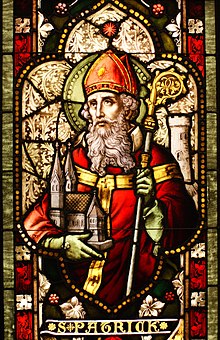Welcome to DU!
The truly grassroots left-of-center political community where regular people, not algorithms, drive the discussions and set the standards.
Join the community:
Create a free account
Support DU (and get rid of ads!):
Become a Star Member
Latest Breaking News
Editorials & Other Articles
General Discussion
The DU Lounge
All Forums
Issue Forums
Culture Forums
Alliance Forums
Region Forums
Support Forums
Help & Search
Weekend Economists Toast the Apostle of Ireland March 14-16, 2014 [View all]

Saint Patrick (Latin: Patricius; Proto-Irish: *Qatrikias; Modern Irish: Pádraig; Welsh: Padrig) was a 5th-century Romano-British Christian missionary and bishop in Ireland... he is the primary patron saint of the island along with Saints Brigit and Columba.
The dates of Patrick's life cannot be fixed with certainty but, on a widespread interpretation, he was active as a missionary in Ireland during the second half of the fifth century. He is generally credited with being the first bishop of Armagh, Primate of Ireland.
When he was about 16, he was captured from his home in Great Britain, and taken as a slave to Ireland, where he lived for six years before escaping and returning to his family. After becoming a cleric, he returned to northern and western Ireland. In later life, he served as an ordained bishop, but little is known about the places where he worked. By the seventh century, he had already come to be revered as the patron saint of Ireland.
Saint Patrick's Day is observed on 17 March, the date of his death. It is celebrated inside and outside Ireland as a religious and cultural holiday. In the dioceses of Ireland, it is both a solemnity and a holy day of obligation; it is also a celebration of Ireland itself.
Two Latin letters survive which are generally accepted to have been written by St. Patrick. These are the Declaration (Latin: Confessio) and the Letter to the soldiers of Coroticus (Latin: Epistola), from which come the only generally accepted details of his life. The Declaration is the more important of the two. In it, Patrick gives a short account of his life and his mission. Most available details of his life are from subsequent hagiographies and annals, and these are now not accepted without detailed criticism....wikipedia


http://www.catholic.org/saints/saint.php?saint_id=89
St. Patrick of Ireland is one of the world's most popular saints: Apostle of Ireland, born at Kilpatrick, near Dumbarton, in Scotland, in the year 387; died at Saul, Downpatrick, Ireland, 17 March, 461...Patrick was born around 385 in Scotland, probably Kilpatrick. His parents were Calpurnius and Conchessa, who were Romans living in Britian in charge of the colonies...
wikipedia, again:
Saint Patrick's Day was made an official Christian feast day in the early seventeenth century and is observed by the Catholic Church, the Anglican Communion (especially the Church of Ireland), the Eastern Orthodox Church and Lutheran Church. The day commemorates Saint Patrick and the arrival of Christianity in Ireland, as well as celebrates the heritage and culture of the Irish in general. Celebrations generally involve public parades and festivals, céilithe, and the wearing of green attire or shamrocks. Christians also attend church services, and the Lenten restrictions on eating and drinking alcohol are lifted for the day, which has encouraged and propagated the holiday's tradition of alcohol consumption.
Saint Patrick's Day is a public holiday in the Republic of Ireland, Northern Ireland, Newfoundland and Labrador and Montserrat. It is also widely celebrated by the Irish diaspora around the world; especially in Britain, Canada, the United States, Argentina, Australia and New Zealand.
33 replies
 = new reply since forum marked as read
Highlight:
NoneDon't highlight anything
5 newestHighlight 5 most recent replies
= new reply since forum marked as read
Highlight:
NoneDon't highlight anything
5 newestHighlight 5 most recent replies